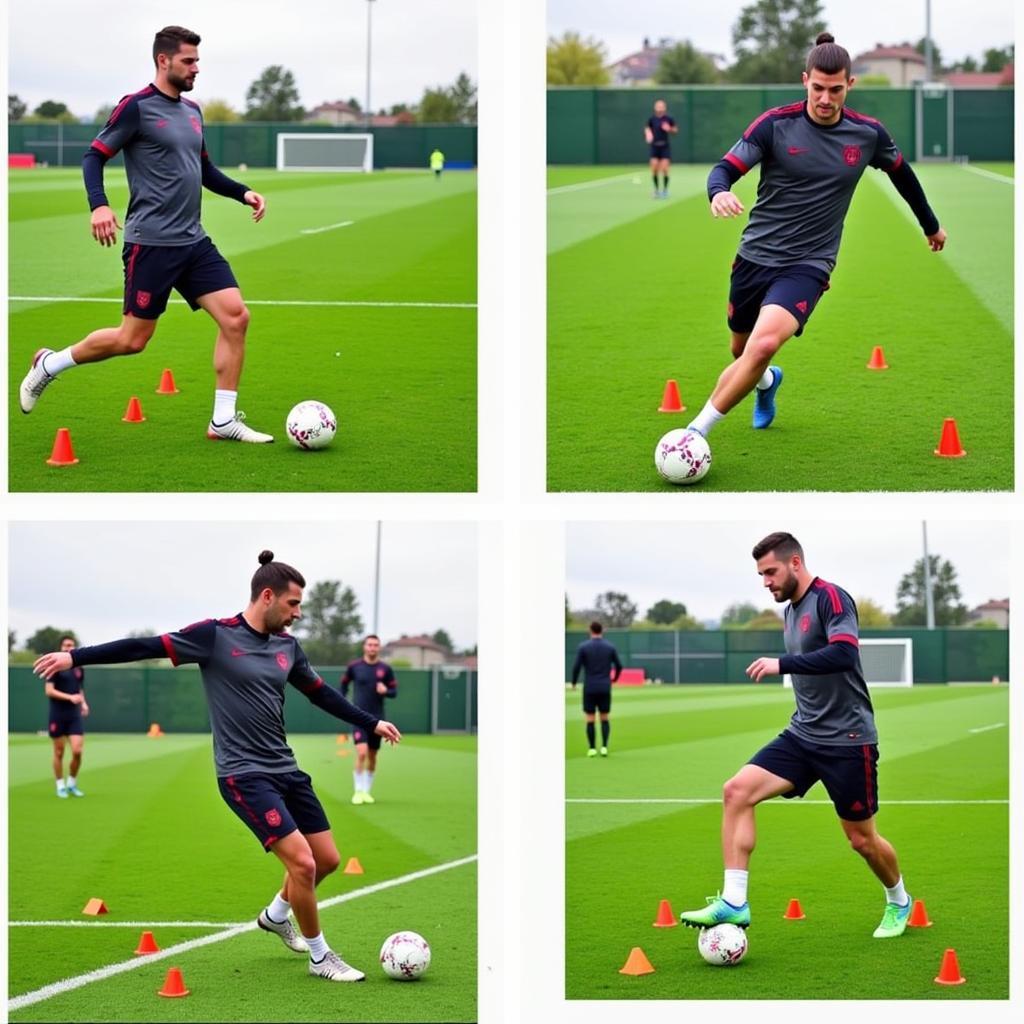How a Full-Time Footballer Stays Fit
November 6, 2024Being a professional footballer like myself requires peak physical condition. It’s not just about scoring goals, it’s about maintaining the stamina, strength, and agility to perform at the highest level week after week. So, how does a full-time footballer stay fit? It’s a complex combination of training, diet, and recovery.
Training Regimen for Peak Performance
A typical week for a footballer involves a variety of training sessions designed to improve different aspects of our game. These include:
- Tactical Training: We work on team formations, strategies, and specific plays to enhance our understanding of the game and improve our coordination on the pitch.
- Technical Training: This focuses on honing individual skills such as ball control, passing, shooting, and dribbling. Repetition is key to mastering these techniques.
- Physical Training: This is where we build strength, speed, and endurance. We incorporate exercises like weightlifting, sprints, and plyometrics to push our physical limits.
- Recovery Sessions: These are crucial for preventing injuries and allowing our bodies to repair themselves. This might involve light cardio, stretching, or even yoga.
 Footballer practicing dribbling and ball control drills
Footballer practicing dribbling and ball control drills
The Importance of a Balanced Diet
Diet plays a huge role in a footballer’s fitness. We need to fuel our bodies with the right nutrients to perform at our best and recover effectively. My diet is rich in:
- Lean Protein: Essential for muscle growth and repair. I consume a lot of chicken, fish, and eggs.
- Complex Carbohydrates: These provide sustained energy throughout training and matches. Sources include whole grains, brown rice, and sweet potatoes.
- Healthy Fats: Important for hormone production and overall health. I include avocados, nuts, and olive oil in my diet.
- Fruits and Vegetables: Packed with vitamins and minerals that support immune function and recovery.
Recovery and Rest: The Unsung Heroes
Recovery is just as important as training and nutrition. Without proper rest, our bodies can’t repair and rebuild, leading to increased risk of injury and burnout. Key recovery strategies include:
- Sleep: Aiming for 8-10 hours of quality sleep per night is crucial for muscle recovery and hormone regulation.
- Hydration: Staying properly hydrated is vital for performance and recovery. I drink plenty of water throughout the day.
- Active Recovery: Light activities like walking or swimming can help reduce muscle soreness and improve blood flow.
- Mental Relaxation: Managing stress and getting enough downtime is essential for both physical and mental well-being. I find listening to music and spending time with family and friends helps me relax.
Maintaining Consistency: The Long-Term Game
Staying fit as a full-time footballer is a continuous process. It requires discipline, dedication, and a long-term commitment to healthy habits. It’s not about quick fixes, but about consistently making the right choices day in and day out.
In conclusion, how a full-time footballer stays fit involves a comprehensive approach that encompasses training, nutrition, and recovery. It’s a demanding but rewarding lifestyle that requires constant effort and dedication. Maintaining peak physical condition is crucial for success in this demanding sport.
FAQ
- What type of training do footballers do? Footballers engage in tactical, technical, physical, and recovery training.
- What is a typical footballer’s diet like? A footballer’s diet emphasizes lean protein, complex carbohydrates, healthy fats, and fruits and vegetables.
- How important is sleep for footballers? Sleep is crucial for muscle recovery, hormone regulation, and overall performance.
- How do footballers recover after training? Footballers recover through adequate sleep, hydration, active recovery, and mental relaxation.
- What is the key to staying fit as a footballer? Consistency in training, nutrition, and recovery is the key to long-term fitness for a footballer.
- How do you maintain your fitness level during the off-season? I maintain a structured training program, continue with healthy eating habits, and focus on active recovery.
- What advice would you give to aspiring footballers about fitness? Focus on developing a well-rounded fitness regime that encompasses all aspects of training, nutrition, and recovery. Consistency is key!
Common Situations and Questions:
- Situation: Feeling fatigued during training. Question: How can I improve my stamina?
- Situation: Experiencing muscle soreness after a match. Question: What are the best recovery strategies for muscle soreness?
- Situation: Struggling to maintain a healthy diet while traveling. Question: How can I make healthy food choices on the go?
Further Reading and Related Articles:
- Nutrition for Peak Athletic Performance
- The Importance of Sleep for Athletes
- Injury Prevention Strategies for Footballers
If you need any further assistance, please contact us at Phone Number: 0396443476, Email: [email protected] or visit us at 23 Thang 3, Dak Nia, Gia Nghia, Dak Nong, Vietnam. We have a 24/7 customer service team.